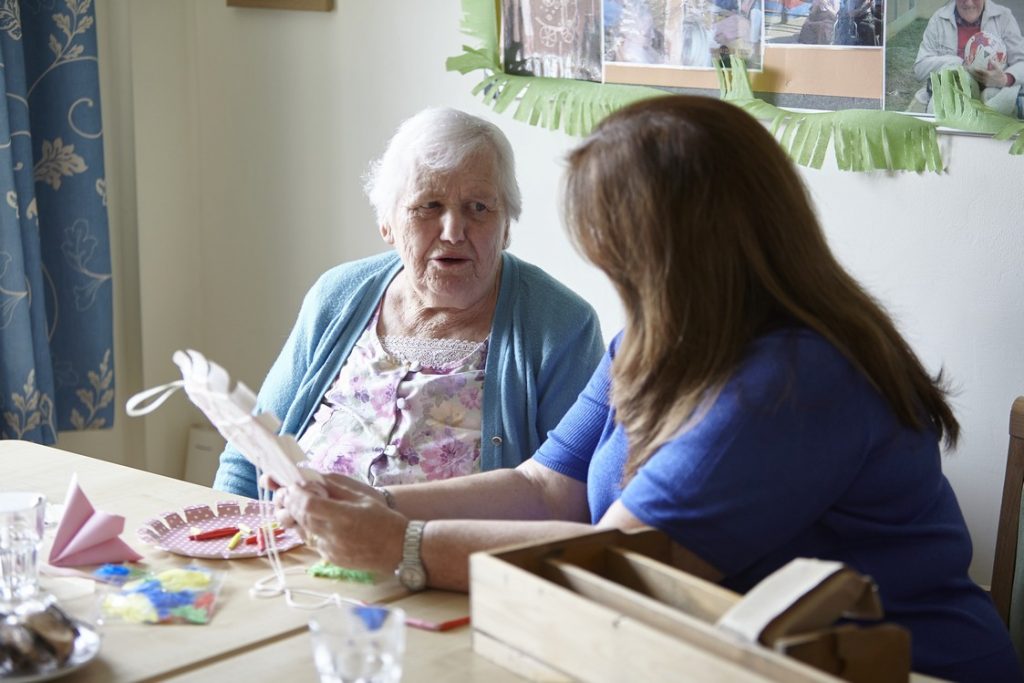A pilot where care workers are upskilled to monitor the health of patients shows considerable potential.
Caring for frail older people in rural Wales, whether in a pandemic or not, can be challenging.
Having trustworthy regular clinical information to inform your decisions can make a difference to both patient and health care staff. On the north-west coast of the Llŷn Peninsula, a novel approach to upskilling care workers in the community is being piloted.
A partnership with General Practitioners (GPs) and a home care provider has led to the training of community social care workers being supported to undertake basic observations with patients in the comfort of their own home.
The training has included: taking a pulse, pulse oximetry (checking oxygen saturation levels in the blood), heart rate, blood pressure, and taking a temperature.
The purpose of the approach is to help the GP through facilitating patient observations so that the GP can make decisions about what treatment may or may not be required whilst also ensuring that respect is given to what matters most to patients, for example, staying at home.
They have developed a five-step process:
- A patient is assessed by telephone triage.
- The GP rings the care worker on their mobile phone.
- They discuss which observations are required.
- The care worker travels to the house, undertakes the observations and calls the GP back.
- This facilitates a face to face consultation if necessary on a widely available video consultation platform (accuRx)
So how useful can this model be during very difficult situations, such as end of life care, during COVID-19? Lydia’s story illustrates why this pilot has been so successful.
May 26th, 2020, was a particularly busy afternoon as an urgent request came in for a home visit. Lydia had been treated for probable carcinoma of the lung but now was suspected as having COVID-19.
Lydia was an ex-nurse and knew that her condition was deteriorating. She was waiting for a bronchoscopy result and she expressed the wish to remain at home, to die at home with her husband at her side. She did not want to go into hospital if at all possible.
This was at the height of COVID-19 in north Wales and deciding which patient to visit first in these unusual circumstances was difficult, especially as there was also a long wait for an ambulance.
Gofal Seibiant (GS), a home care service based in north Wales, went to visit Lydia with their diagnostic equipment and facilitated a video consultation between patient and GP.
“The benefits of upskilling care workers can be seen for patients, family/carers, and the practice.”
Lydia and her GP decided that Lydia’s health and care needs were best met at home and so arrangements were made for medication and palliative care. Lydia died a few days later at home in her husband’s arms – just as she wished.
This approach has also been useful for practice nurses in Nefyn. A patient – who we’ll call Mary – had a social call every week and some shopping from GS.
After a fortnight, the nurse asked for the observations to be a regular part of the visit, which was agreed for a Monday and Thursday. This helped the practice nurse to gain an understanding of what was ‘normal’ for Mary.
As this was part of Mary’s routine, she wasn’t alarmed by the process. It was simply a good service provided by GS and there were fewer people coming to her house unnecessarily.
The benefits of upskilling care workers can be seen for patients, family/carers, and the practice.
What mattered to Mary and Lydia was important and respected without sacrificing the quality of a good service and re-focussed where possible on preventative care.
Further, the model offers reassurance, reduces the number of professionals visiting individuals’ homes each week, and supports the timely delivery of care to patients.
The service itself benefitted by releasing GP and district nursing time to focus on what they do best. This proactive approach to patient care aligns well with recent Welsh Government directives of Prudent Healthcare, Care Closer to Home, and A Healthier Wales.
For the workforce, care workers have an enhanced skillset, and an elevated role, which makes it more rewarding. It also strengthens the connection between professionals within the Community Resource Team, generating a team that puts the needs of the person requiring support in the community setting at the centre of the intervention.
“This pilot has shown that GPs, care workers and crucially, patients, deem this a success.”
Wider benefits include early intervention and prevention, prevention/reduction of hospital admissions, and increased capacity for other healthcare staff (e.g. paramedics).
The approach in Nefyn is taking place in the wider context of wholescale transformation of the home care system in Gwynedd.
Enablers to the implementation and delivery of the pilot have included the independence of the GP practice, and the buy-in and engagement of the care provider and its workforce, which has been a crucial component.
For care workers, factors supporting a successful move towards preventative approaches identified by Wavehill (2019) include:
– Knowledge, attitudes and behaviours of staff
– Changes are aligned with their values and beliefs
– Benefits to those needing care and support
The report also acknowledges ‘the merit in developing core principles or a common holistic skillset for social care, to sit alongside existing prevention work’.
The Nefyn model is underpinned by collaboration, trust and a partnership between social care and clinicians and demonstrates how the upskilling of home care workers can be used to advance a preventative agenda.
Discussions and debates that drive Wales forward.
Join Wales’ leading independent think tank.
Considerations to replicate this model elsewhere might include aspects such as accountability, for example, who has responsibility for the supervision of care workers, risk assessments, training, and equipment.
Future aspirations for the Nefyn model include the continuation of upskilling carers in the community in aspects such as phlebotomy and dressings courses, developing a ‘pastoral’ role for workers to support patients recently discharged from hospital, and a roll out of the pilot.
This pilot has shown that GPs, care workers and crucially, patients, deem this a success. An approach which allows people to be cared for whilst minimising the disruption and inconvenience to their lives is integral to the person-centred care that we want to see in Wales.
If an expanded roll-out of this pilot replicates this success, we hope that this can model a new way of supporting people in communities to remove some of the existing barriers between health and social care.
All articles published on the welsh agenda are subject to IWA’s disclaimer.





